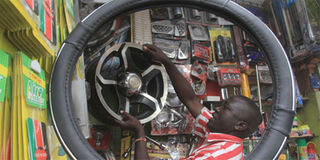Breaking News: At least 10 feared to have drowned in Makueni river
Spare parts firms jostle for space with counterfeits

A spare parts dealer removes a wheel rim for a customer at his shop in Nyeri town. High import duty and competition from counterfeit dealers are major challenges in the business. PHOTO | JOSEPH KANYI
What you need to know:
- Motor vehicle traders are raising the alarm over the increasing presence of counterfeit spare parts that are driving genuine dealers out of the market and compromising road safety as the government loses billions of shillings annually in taxes.
- Unscrupulous dealers have perfected the art of imitating the original branding and packing.
- Nairobi’s Kirinyaga Road is said to be the hub of dealers, with consumers more worried about price than originality.
Kenya is grappling with proliferation of generic car spares putting lives in peril, according to a section of genuine dealers.
The generic parts are mainly imported from China and Turkey with their dens mainly located along Nairobi’s Kirinyaga Road after Tanzania enacted tough market policies to curb the menace.
This comes even as Kenya loses an average of 3,000 lives through road accidents annually, placing it among countries with the highest road carnage globally.
And now motor vehicle traders are raising the alarm over the increasing presence of counterfeit spare parts that are driving genuine dealers out of the market and compromising road safety as the government loses billions of shillings annually in taxes.
“In a market where fleet owners look at the price, the implications are dire in the long-run. Most of cargo and passenger transport vehicles stall on roads because of use of low quality spare parts,” said Al-fayaz Sunderji, sales and marketing director for Wilex GmbH in Nairobi.
A study by the Anti-Counterfeits Authority (ACA) posted on its website reveals that buyers of fake products believe they are as good as genuine products. “People buy these fake products because they don’t care if they’re real, while some just buy them because it’s all they can afford as they are very cheap,” it says.
A survey carried out by Toyota Kenya indicated that eight out of 10 vehicles in the country had at least one fake spare part. The study was carried out at the firms dealerships spread across the country on vehicles brought in for service.
Unscrupulous dealers have perfected the art of imitating the original branding and packing.
“Everything from the logo looks fine, the barcode too; only that it is a previous barcode that was changed in 2012. The Kenya Bureau of Standards (Kebs) is not doing a thorough scan of the market,” said Mr Sunderji.
In response Kebs says all automobile spare parts getting into the country are inspected at their country of origin under the Pre-Export Verification of Conformity to Standards (PVOC) programme, according director of quality assurance Eric Chesire.
The standards body said it does periodic sampling at entry points. The public can verify if products are certified via mobile phones services. According Chesire, all a consumer needs is to send a text message with the product’s brand name or standardisation mark permit number to 22203. “You simply type SM#brand name or standardisation mark permit number and SMS to 20023 from a Safaricom #ticker:SCOM line,” he said.
In addition, Kebs also conducts targeted market surveillance, which happens periodically. However, this happens in locations that incidences of low quality spare parts have been reported.
“Unfortunately, most of the times members of the public do not volunteer this information,” notes Mr Chesire.
A family-owned business that operates from Germany and Nairobi, Wilex GmbH supplies genuine aftermarket OEM spare parts for European trucks and cars.
From Nairobi the company services their dealers in Tanzania, Uganda, Rwanda, Burundi, Democratic Republic of Congo, Ethiopia, South Sudan Mozambique, Malawi and all over Kenya.
“Africa is a big market for motor vehicle spare parts with over 120 containers being consumed within a month in the East African region. Our network of 60 dealers, each distribute about two containers of spare parts in a month,” says Mr Sunderji. Kenya, the biggest market consumes slightly over 12 containers of motor vehicle spare parts in a month.
“There is need for Kebs to engage stakeholders in the industry and to register a list of genuine spare parts dealers that can be used to check on imports from points of entry,” he proposes.
After a one-and-half-year market slowdown, the industry is slowly making a comeback as seen in the rise in demand for truck and motor vehicle spare parts in the East African region since January.
“We have seen a 30 per cent rise in customer demand for spare parts, this is unlike the last quarter in 2017 when business was almost at a plateau phase,” said Mr Sunderji.
He dispels the view that the new train freight cargo in Kenya may deal a blow to goods trucking business across the region. “In Europe, the railway cargo freight is a big industry, yet the cargo trucking industry is very vibrant,” he says.
The reach of SGR cargo train has created even more business for trucks as it necessitates that the goods be offloaded and transported by road into warehouses,” said Mr Sunderji.




